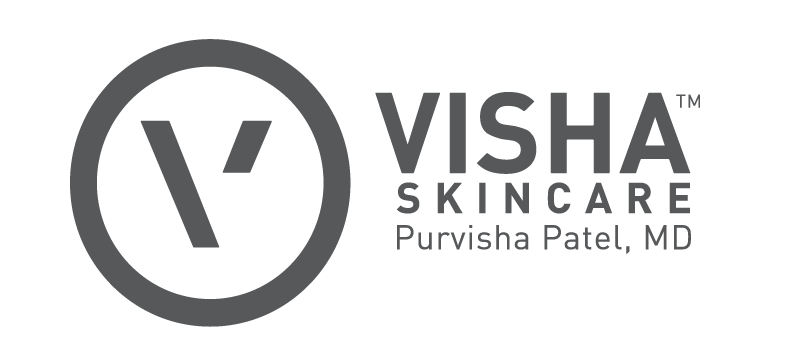
MindBodyGreen posted "What Is Your Skin Type? Find Out With This Quiz + Expert-Approved Products" and features Visha Skincare founder, Dr. Purvisha Patel's expert commentary on sensitive skin and why sensitive skin is unable to tolerate harsh conditions.
Before building a skin care routine—no matter how simple or robust—it's important to ask yourself: What is my skin type? While everyone's skin is nuanced and unique, it's helpful to address your general skin care circle—that is, dry, oily, acne-prone, combination, or sensitive.
If you're a little unsure, though, you've come to the right place: Here, a quick skin-type quiz to I.D. your complexion, with derm advice for picking the right products. Happy browsing...
Why skin type matters.
Simple: You can't craft a skin care routine without knowing exactly what your skin needs. And while everyone's skin has individual characteristics, skin types can help you navigate what kinds of formulas your skin loves—and, consequently, what you should avoid.
For example, if you know your skin runs dry, you wouldn't necessarily treat it with an oil-absorbing charcoal mask; rather, you might gravitate toward a nourishing face oil to lock in moisture. And if your skin reads acne-prone? Chances are you wouldn't opt for heavy coconut oil, as it has the potential to clog pores. BHAs are far better for keeping breakouts at bay.
Become familiar with your skin type, and you can save time (and money) discovering what works best for your skin and what can lead to acne or irritation down the line.
Understanding your skin type.
Let's break down those results:
1. Dry skin
If your skin runs dry, you likely experience cracks and flakes, and your skin may also feel tight post-cleansing.
Chronically dry skin is also a telltale sign you have a compromised skin barrier, as water can easily evaporate from a weakened barrier and leave the skin parched. Your skin also may become naturally drier as you age since your skin's natural oil production and structural components—like collagen, elastin, hyaluronic acid—start to decrease and break down as you grow older; as such, locking in as much moisture as you can is a must.
2. Acne-prone skin
Acne-prone skin is often oily, but it doesn't have to be: Acne-prone skin can also be dry, combination, or sensitive. "Whether your skin is acne-prone has to do with your genetics, your hormonal fluctuations, and your stress level typically," says board-certified dermatologist Jeanine Downie, M.D., co-host of The GIST Show. "For some people, their acne is complicated by what they eat as well as lack of sleep."
Translation: Having acne-prone skin means you're more prone to breakouts, perhaps due to factors that are simply out of your control (like genetics).
3. Oily skin
If you have oily skin, that means you have increased oil production all over—both on the cheeks and along the T-zone. "When you have oily skin, it is something you will notice all over your face, as opposed to just one restricted area," celebrity esthetician and dermatological nurse Natalie Aguilar once shared with mbg.
Oily skin is often also acne-prone, as sebum can become trapped in the pores and lead to breakouts, but this is not always the case. "Just because your skin is oily does not necessarily mean it is acne-prone at all," says Downie. You may just have more shine, simple as that.
4. Combination skin
"Combination skin is part oily, part dry," Downie previously told us about the skin type. "Typically, it's oily in the T-zone and drier on the cheeks." As such, your breakouts tend to crop up around your forehead, nose, and chin, where you'll typically accrue the most oil. And after cleansing, your forehead and cheeks may feel tight, whereas your nose and chin read more shiny.
5. Sensitive skin
Technically, there's no scientific consensus on the true definition of "sensitive skin," but most experts would say: Sensitive skin is associated with a compromised skin barrier. That's why "sensitive skin is characterized by skin that is not able to tolerate harsh conditions, [cosmetics products], environments, or even diets," says board-certified dermatologist Purshiva Patel, M.D., founder of Visha Skincare, as these irritants can trigger uncomfortable, sometimes painful, reactions.
And for what it's worth, any skin type can also run sensitive (be it oily, combination, or dry), but since a weakened skin barrier typically goes hand in hand with dryness, those two skin types seem to be a common pair.
Picking skin care products for your skin type.
Now that you've identified your skin type, let's craft your tailored routine and product arsenal.
If you have dry skin...
You'll want to coat the skin with ingredients like ceramides, colloidal oat, aloe, and shea butter "to lock in moisture and restore your skin barrier," board-certified dermatologist Shereene Idriss, M.D., explains. You'll also want to use cleansers and soaps without harsh surfactants, as these can strip the skin of its natural oils and dry it out further.
As for moisturizers, opt for a rich, butter-thick moisturizer (our favorites here) rather than a light water cream. You may even want to top your moisturizers with an oil to make sure water stays housed inside.
